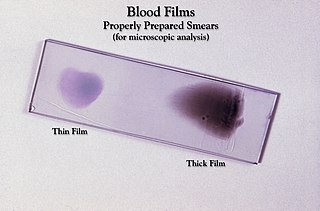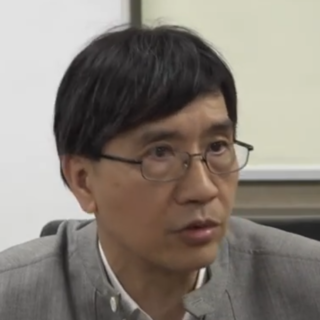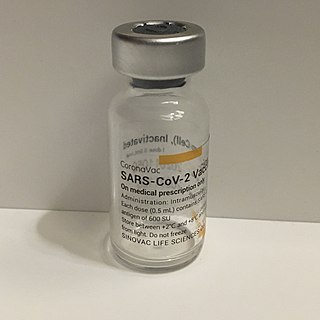Related Research Articles

Clinical pathology is a medical specialty that is concerned with the diagnosis of disease based on the laboratory analysis of bodily fluids, such as blood, urine, and tissue homogenates or extracts using the tools of chemistry, microbiology, hematology, molecular pathology, and Immunohaematology. This specialty requires a medical residency.

Yuen Kwok-yung is a Hong Kong microbiologist, physician and surgeon. He is a prolific researcher, with most of his nearly 800 papers related to research on novel microbes or emerging infectious diseases. He led a team identifying the SARS coronavirus that caused the SARS pandemic of 2003–4, and traced its genetic origins to wild bats. During the ongoing COVID-19 pandemic, he has acted as expert adviser to the Hong Kong government.

A medical laboratory or clinical laboratory is a laboratory where tests are conducted out on clinical specimens to obtain information about the health of a patient to aid in diagnosis, treatment, and prevention of disease. Clinical medical laboratories are an example of applied science, as opposed to research laboratories that focus on basic science, such as found in some academic institutions.
Professor Ravindra "Ravi" Kumar Gupta is a professor of clinical microbiology at the Cambridge Institute of Therapeutic Immunology and Infectious Disease at the University of Cambridge. He is also a member of the faculty of the Africa Health Research Institute in Durban, South Africa.

COVID-19 drug development is the research process to develop preventative therapeutic prescription drugs that would alleviate the severity of coronavirus disease 2019 (COVID-19). From early 2020 through 2021, several hundred drug companies, biotechnology firms, university research groups, and health organizations were developing therapeutic candidates for COVID-19 disease in various stages of preclinical or clinical research, with 419 potential COVID-19 drugs in clinical trials, as of April 2021.
Pandemic prevention is the organization and management of preventive measures against pandemics. Those include measures to reduce causes of new infectious diseases and measures to prevent outbreaks and epidemics from becoming pandemics.

CoronaVac, also known as the Sinovac COVID-19 vaccine, is a whole inactivated virus COVID-19 vaccine developed by the Chinese company Sinovac Biotech. It was phase III clinically trialled in Brazil, Chile, Indonesia, the Philippines, and Turkey and relies on traditional technology similar to other inactivated-virus COVID-19 vaccines, such as the Sinopharm BIBP vaccine, another Chinese vaccine, and Covaxin, an Indian vaccine. CoronaVac does not need to be frozen, and both the final product and the raw material for formulating CoronaVac can be transported refrigerated at 2–8 °C (36–46 °F), the temperatures at which flu vaccines are kept.

There are many variants of severe acute respiratory syndrome coronavirus 2 (SARS-CoV-2), the virus that causes coronavirus disease 2019 (COVID-19). Some are believed, or have been stated, to be of particular importance due to their potential for increased transmissibility, increased virulence, or reduced effectiveness of vaccines against them. These variants contribute to the continuation of the COVID-19 pandemic.

Shabir Ahmed Madhi, is a South African physician who is professor of vaccinology and director of the South African Medical Research Council Respiratory and Meningeal Pathogens Research Unit at the University of the Witwatersrand, and National Research Foundation/Department of Science and Technology Research Chair in Vaccine Preventable Diseases. In January 2021, he was appointed Dean of the Faculty of Health Sciences at the University of the Witwateratand.
Misaki Wayengera is a Ugandan physician, academician, and a medical researcher. He serves as a lecturer for Pathology, Immunology and Molecular Biology at Makerere University College of Health Sciences. He is the chairperson of Uganda's Scientific Advisory Committee on COVID-19 for the Ministry of Health and the National Task Force.
Michael Joseph Mina is an American epidemiologist, immunologist and physician. He was formerly an assistant professor of Epidemiology & Immunology and Infectious Diseases at Harvard T.H. Chan School of Public Health, assistant Professor of Pathology at Brigham and Women's Hospital, Harvard Medical School, and currently Chief Medical Officer at eMed.

The term variant of concern (VOC) for SARS-CoV-2, which causes COVID-19, is a category used for variants of the virus where mutations in their spike protein receptor binding domain (RBD) substantially increase binding affinity in RBD-hACE2 complex, while also being linked to rapid spread in human populations.
The TRIPS Agreement waiver is a joint intervention communication by South Africa and India to the TRIPS council of the World Trade Organization (WTO) on 2 October 2020.
The Association for Molecular Pathology is a professional association of individuals serving patients through molecular diagnostics testing. Founded in 1995, the Association has more than 2,800 members in over 50 countries.

Omicron (B.1.1.529) is a variant of SARS-CoV-2 first reported to the World Health Organization (WHO) by the Network for Genomics Surveillance in South Africa on 24 November 2021. It was first detected in Botswana and has spread to become the predominant variant in circulation around the world. Following the original B.1.1.529 variant, several subvariants of Omicron have emerged including: BA.1, BA.2, BA.3, BA.4, and BA.5. Since October 2022, two subvariants of BA.5 called BQ.1 and BQ.1.1 have emerged.

This timeline of the SARS-CoV-2 Omicron variant is a dynamic list, and as such may never satisfy criteria of completeness. Some events may only be fully understood and/or discovered in retrospect.
Tulio de Oliveira is a Brazilian, Portuguese, and South African permanent resident professor of bioinformatics at the University of KwaZulu-Natal and Stellenbosch University, South Africa, and associate professor of global health at the University of Washington. He has studied outbreaks of chikungunya, dengue, hepatitis B and C, HIV, SARS-CoV-2, yellow fever and Zika. During the COVID-19 pandemic he led the team that confirmed the discovery of the Beta variant of the COVID-19 virus in 2020 and the Omicron variant in 2021.
Eftyhia Vardas FC Path is an honorary extraordinary professor in medical virology at the Department of Medical Virology, University of Stellenbosch, and head of virology at Lancet Laboratories in Johannesburg. She is a member of the COVID-19 Ministerial Advisory Committee to the South African minister of health.
Carey-Ann Burnham is a clinical microbiologist, and a professor of Pathology and Immunology, Molecular Microbiology, Pediatrics and Medicine in Washington University School of Medicine in St. Louis. She is an elected fellow of the American Academy of Microbiology.
Vietnamese-German Center for Medical Research (VG-CARE) was founded in 2015.
References
- ↑ "Lancet Zimbabwe is part of a pathology laboratory which is Internationally Accredited". www.lancet.co.zw. Retrieved 8 January 2022.
- ↑ Commonwealth Secretariat (2007). Commonwealth Heads of Government Meeting 2007. London: Henley Media Group. p. 57. ISBN 978-0-9554408-3-0.
- 1 2 3 4 Dumasi, Manelesi (12 February 2016). "Lancet Laboratories – Pathology Services Without Borders | Enterprise Africa". Enterprise-africa.net. Retrieved 11 January 2022.
- ↑ "Trial of potentially variant-proof vaccine ongoing in Western Cape | Institute Of Infectious Disease and Molecular Medicine". www.idm.uct.ac.za. Retrieved 8 January 2022.
- ↑ Antony, Sguazzin (30 November 2021). "How the Omicron strain in SA was traced by a missing gene". TimesLIVE. Retrieved 9 January 2022.
- ↑ Clarke, Steve Neville and Vivienne (29 November 2021). "Vigilance of junior scientist led to discovery of Omicron variant". Irish Examiner. Retrieved 8 January 2022.
- 1 2 "How S African scientists discovered Omicron; country got raw deal in turn". The Federal. 1 December 2021. Retrieved 8 January 2022.
- ↑ Pieterse, Jan Nederveen; Lim, Haeran; Khondker, Habibul (10 June 2021). Covid-19 and Governance: Crisis Reveals. Routledge. ISBN 978-1-000-39529-7.
- ↑ Adan, Abdihamid Daud; Reuben, James Mwikya (September 2020). "Effect of Information Communication Technology Innovation Policy, Training and Skills on Efficiency of Service Delivery in Private Laboratories in Kenya". International Journal of Research and Innovation in Social Science. IV (IX). ISSN 2454-6186.